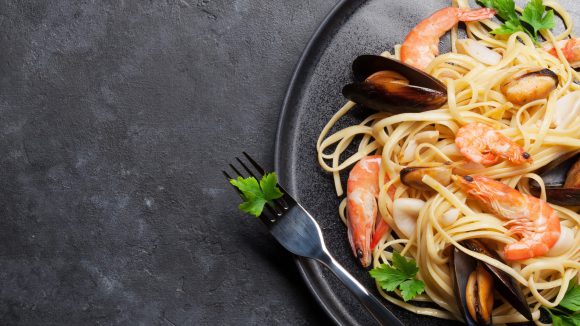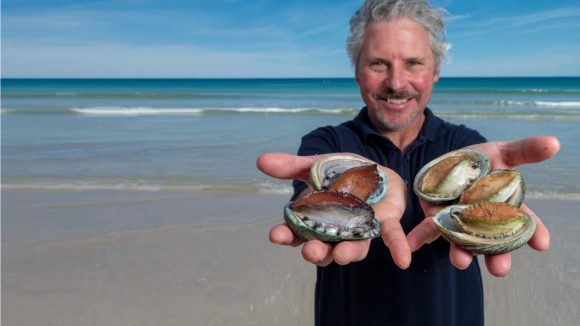
Learn more about mussels
Mussel is the common name for members of several families of bivalve molluscs, which live in saltwater and freshwater habitats around the world.
There are many species of mussels, but the four main commercially farmed species all belong to the family Mytilidae.
Equally delicious to eat are Mytilus edulis, which are farmed in Northern Europe and Canada, the larger Mytilus galloprovincalis, which is found in the Mediterranean and on the West coast of Canada, Mytilus chilensis, which grows in the region around Chile, and Mytilus coruscus, which is produced in Korea.
The large, green-lipped mussel Perna canaliculus is the main mussel produced in New Zealand. Other important mussels include Perna viridis, which is grown in South Asian countries, and Perna perna, which is common in West Africa and the Caribbean.
In the wild
Mussels create byssal threads using a gland located within their foot. These are strong, silky fibres made from proteins, which are used to stick themselves together, or to attach to rocks, ropes and other underwater structures, to create their habitats. Mussel reefs attract many marine creatures, which use them for food and shelter.
Farming mussels
Mussels have been cultivated for centuries, and are relatively quick to grow, taking between 6 months and 2 years to go from larvae to harvest size.
According to the Food and Agriculture Organisation of the United Nations (FAO), global mussel production in 2018 was 2.1 million tonnes, with a value of $4.5 billion.
The most significant producers are China, Chile and Spain, with New Zealand, Italy, France, Korea, Netherlands, Denmark and Thailand trailing behind, followed by Canada, Greece and the UK.
Mussels may be cultivated on:
- Suspended longline ropes in bays or the open sea
- Rafts in sheltered bays
- Seabed coastal areas (bottom grown)
- Bouchot poles in intertidal areas, particularly in Northern France
Longline rope culture involves a series of ropes suspended under the water, kept afloat by buoys. Mussel seed is either collected in situ, where it attaches itself naturally to the ropes; in the wild, then attached to ropes with biodegradable cotton or pergolari netting; or purchased from a specialist hatchery.
Raft culture uses a series of rope droppers suspended under rafts close to shore. The mussels grow on the suspended ropes in the same way as traditional rope aquaculture.
Bottom grown mussels use areas of seabed stocked with juvenile mussels, which are allowed to grow to market size before being dredged for harvest.
Bouchot mussels are farmed on wooden bouchot poles, or stakes, situated close to the shore. Juvenile mussels are seeded onto ropes, which are wound around the poles, and secured with a fine mesh to keep them in place. These mussels are exposed to the air as the tide rises and falls, which gives them a distinctive size, shape and flavour.
Impacts of farming mussels
Mussel farming is a very low impact form of aquaculture, particularly the rope culture method, which has been proven to positively impact the environment and the surrounding marine eco systems. Longline farms form hanging reefs in the sea, which provide habitats for a great number of other aquatic species.
Mussels sequester carbon from the atmosphere during their shell growing process and this carbon is then permanently removed from the atmosphere.
However, like all food production, farming mussels can have unintended impacts if it is not done responsibly. For example, mussels could be too efficient in filtering the water, removing nutrients from an ecosystem faster than it can replenish them – this is known as exceeding the ecological carrying capacity. For this reason, ASC certified farmers must demonstrate they are meeting a number of requirements to achieve certification against the Bivalve Standard, which covers mussels and other bivalves such as oysters and clams. Read more about these requirements below, or read more about why we certify bivalves.
Water quality
Mussels are filter feeders and feed entirely off naturally occurring phytoplankton in the water. They are a good indicator of the quality of the water in which they are grown. Farmers must monitor this water quality, which is important not just for the healthy growth of the mussels but can also impact on the wider ecosystem.
Biodiversity
ASC certified mussels must be farmed in a manner that harmonises with the environment and minimises impacts on the local ecosystem. For example, farms must not be sited in areas with key biological or ecological functions, must implement environmental management plans, and demonstrate that no harm is caused to threatened or endangered species or their habitats.
Pollution
ASC certified mussel farms are required to manage the organic deposits on the sediment beneath the farm in a responsible manner. Sulphide levels in the sediment need to be measured at regular intervals and remain within set limits.
Social responsibility
Mussel farmers must operate their farms in a socially responsible manner. This means providing workers with proper health and safety training and paying and treating them fairly. It also means being a good neighbour to local communities, and proactively communicating with them.
Farming of mussels and other bivalves often takes place in coastal areas – these areas are often shared spaces used by many different stakeholders, and it’s important that farmers use them in a way that doesn’t negatively impact these other stakeholders.
Cooking with mussels
Mussels are very quick and easy to cook and lend themselves to a variety of different dishes and flavours.
Considered a superfood, mussels are high in minerals and nutrients, as well as being an excellent source of high-quality protein and low in fat.
Explore More

Learn more about Seafood Farming
Find out how farmed seafood can help feed a growing global population, why fish farming needs to be done responsibly and how you can make a responsible choice.

Visit our Blog
Find out what’s behind the label, what’s going on in the world of aquaculture and how the Aquaculture Stewardship Council is updating and improving its programmes regularly.

The Aquaculture Stewardship Council
We run the world’s leading certification programme for responsibly farmed seafood. Learn about our Certification Programmes and our Impact.



